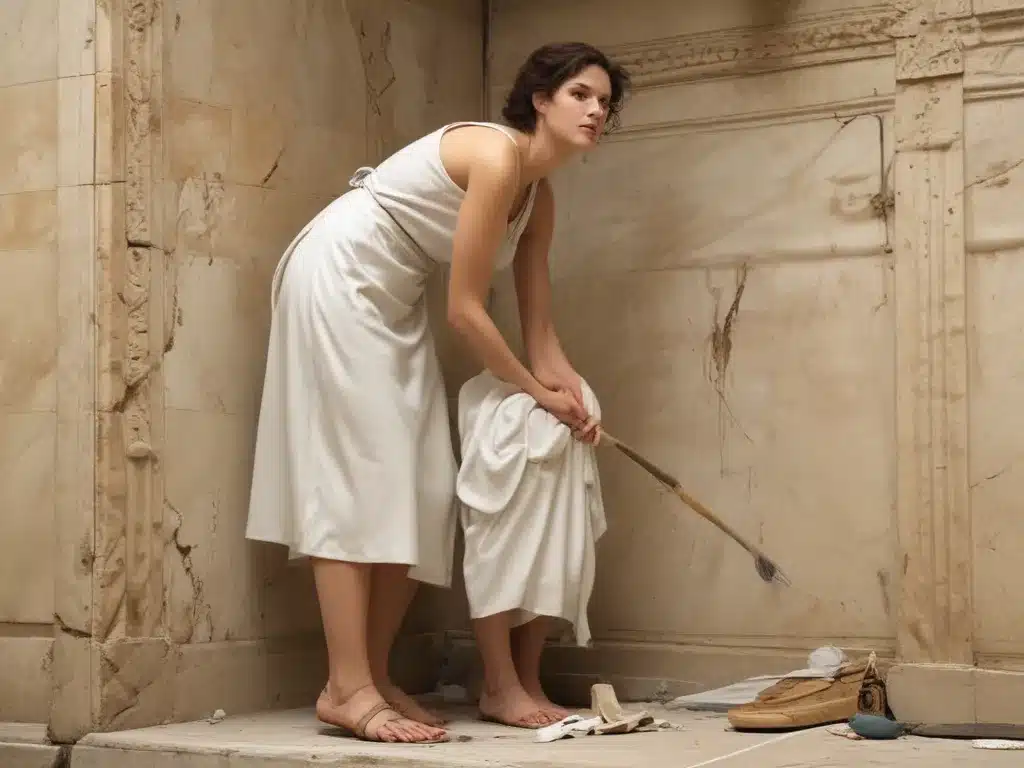Introduction
As a passionate cleaner with a keen interest in history, I have always been intrigued by the ancient cleaning rituals and customs that have shaped our modern practices. From the meticulous house cleansing ceremonies of ancient Egypt to the symbolic purification rites of ancient Greece, these traditions reveal a profound understanding of the cathartic power of cleanliness.
In this article, we will embark on a captivating journey through the annals of history, exploring the intricate and often mystical cleaning customs of antiquity. We will unravel the symbolism, significance, and cultural implications of these practices, gaining a deeper appreciation for the enduring human desire for order, purity, and renewal.
Ancient Egyptian Cleansing Rituals
The ancient Egyptians were renowned for their reverence for cleanliness, viewing it as a sacred pursuit intertwined with their religious beliefs and daily lives. Their cleaning customs were intricate and steeped in symbolism, reflecting their profound respect for the divine and the natural world.
Ritual Purification and the Concept of Ma’at
In ancient Egyptian cosmology, the concept of Ma’at embodied the principles of truth, balance, order, and harmony. Cleanliness played a pivotal role in maintaining Ma’at, as the Egyptians believed that impurities and disorder threatened the cosmic equilibrium.
Egyptians engaged in daily cleansing rituals, such as bathing, shaving, and using fragrant oils and unguents, to purify themselves before engaging in religious ceremonies or entering sacred spaces. These rituals were not merely hygienic practices but also symbolic acts of aligning oneself with the cosmic order and honoring the gods.
Household Cleansing Ceremonies
Egyptian homes were also subject to regular cleansing ceremonies, which involved sweeping, scrubbing, and fumigating with aromatic resins and herbs. This practice was believed to dispel negative energies, ward off evil spirits, and create a harmonious living environment.
One particularly fascinating ritual was the annual cleaning of the Nile Delta homes, which coincided with the inundation of the river. The floodwaters were seen as a purifying force, washing away the impurities of the past year and ushering in a new cycle of renewal and abundance.
Ancient Greek Cathartic Cleansing
In ancient Greece, cleanliness was not merely a practical concern but a deeply ingrained cultural and religious tradition. The Greeks viewed cleanliness as a means of achieving spiritual purity, physical health, and harmony with the natural world.
Purification Rites and the Miasma Concept
The concept of miasma, a form of spiritual pollution, was central to Greek beliefs about cleanliness. Miasma was believed to arise from various sources, such as bloodshed, childbirth, or contact with the dead, and was thought to anger the gods and bring misfortune.
To counteract miasma, the Greeks engaged in elaborate purification rites, which often involved bathing in sacred waters, burning aromatic herbs, and performing sacrificial offerings. These rituals were not only cleansing acts but also symbolic gestures of atonement and reconciliation with the divine.
The Role of Cleanliness in Greek Mythology
Greek mythology is replete with tales that underscore the importance of cleanliness and purification. One notable example is the story of Hercules, who was required to undergo a series of purification rituals after committing a terrible crime in a fit of madness. These rituals, which included bathing in sacred waters and making sacrifices, symbolized his journey towards atonement and spiritual renewal.
Another captivating myth is that of Medusa, whose gaze turned onlookers to stone. The legend suggests that Medusa’s cursed condition was a result of desecrating the temple of Athena, highlighting the grave consequences of impurity and disrespect for sacred spaces.
Ancient Roman Bathing Culture
The ancient Romans were renowned for their advanced plumbing systems and their love of bathing, which was not merely a hygienic practice but also a social and cultural ritual. Roman baths were grand architectural wonders, serving as communal gathering places and centers of relaxation and rejuvenation.
The Thermae: Temples of Cleanliness and Leisure
The Roman thermae, or public baths, were magnificent complexes that combined bathing facilities with gymnasiums, libraries, and spaces for socializing and intellectual discourse. These vast structures were adorned with intricate mosaics, frescoes, and sculptures, reflecting the importance the Romans placed on aesthetics and the pursuit of leisure.
The bathing ritual itself was a multi-step process that involved progressing through a series of heated rooms, culminating in a plunge into the frigidarium, a refreshingly cold pool. This ritualistic journey was believed to purify the body, calm the mind, and promote overall well-being.
Cleanliness and Social Status
In Roman society, cleanliness was not only a matter of hygiene but also a symbol of social status and refinement. The wealthy patrician class could afford to frequent the lavish public baths, while the less affluent plebeians often had to make do with more modest bathing facilities or rely on the communal baths provided by the state.
The Roman passion for cleanliness extended beyond personal grooming and bathing. Public spaces, such as streets and marketplaces, were regularly swept and cleaned, reflecting the Roman commitment to maintaining a well-ordered and hygienic urban environment.
Conclusion
As we have explored, the cathartic cleaning customs of antiquity were deeply rooted in cultural, religious, and social contexts. From the ritual purification practices of ancient Egypt to the communal bathing culture of ancient Rome, these traditions reveal a profound understanding of the transformative power of cleanliness.
Today, as we navigate the complexities of modern life, these ancient practices serve as a reminder of the enduring human need for order, renewal, and harmony. By reconnecting with these timeless traditions, we can tap into the cathartic potential of cleanliness and embrace it as a path towards physical, mental, and spiritual well-being.
At Adam Cleaning, we are committed to upholding the highest standards of cleanliness, drawing inspiration from the rich history and symbolism that have shaped our understanding of this sacred pursuit. Let us embrace the cathartic power of cleanliness and create harmonious spaces that nourish the mind, body, and soul.







